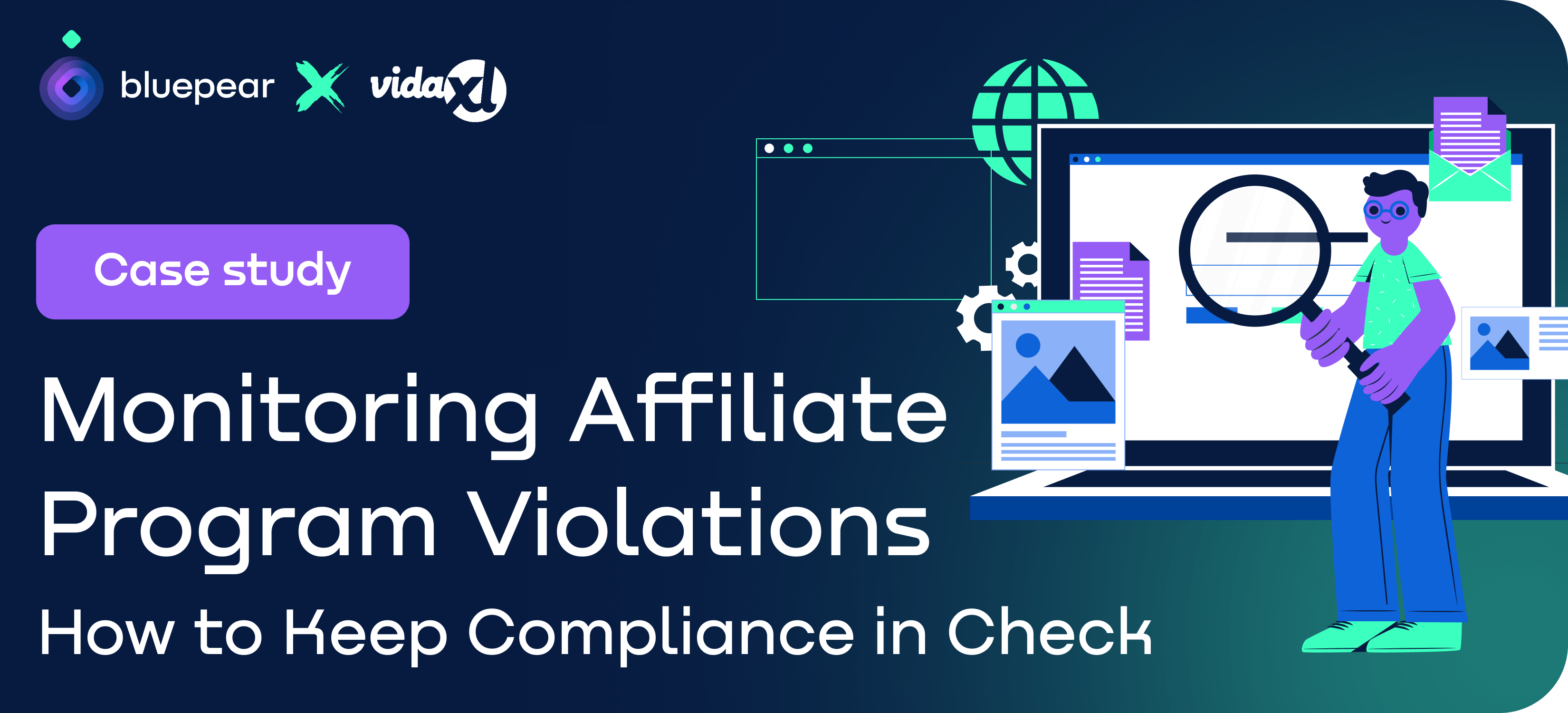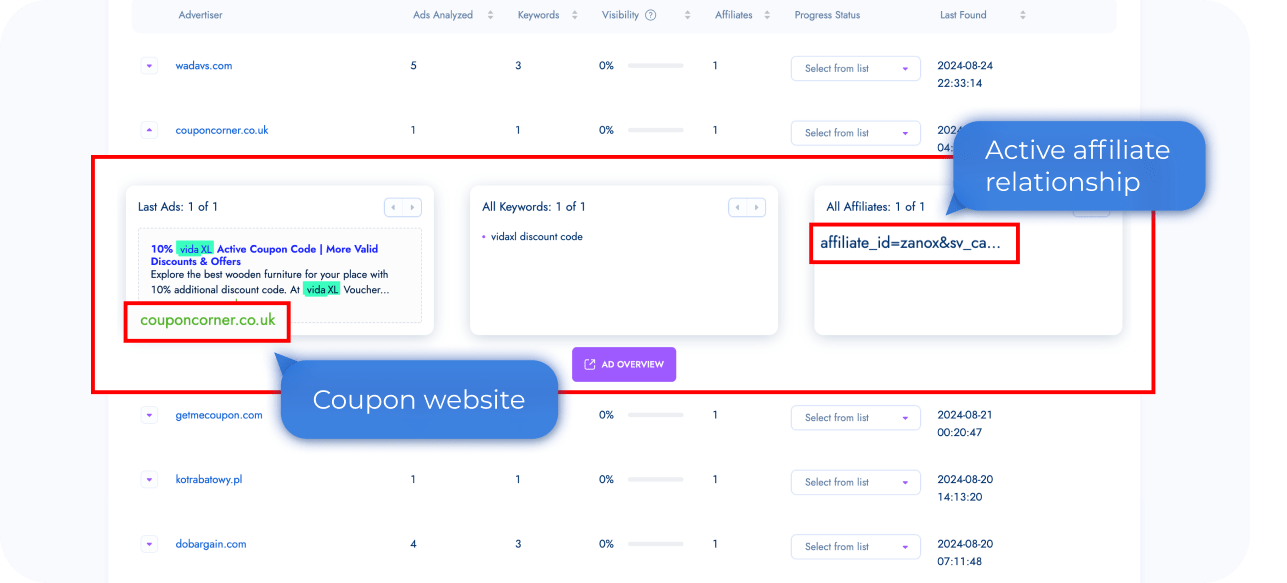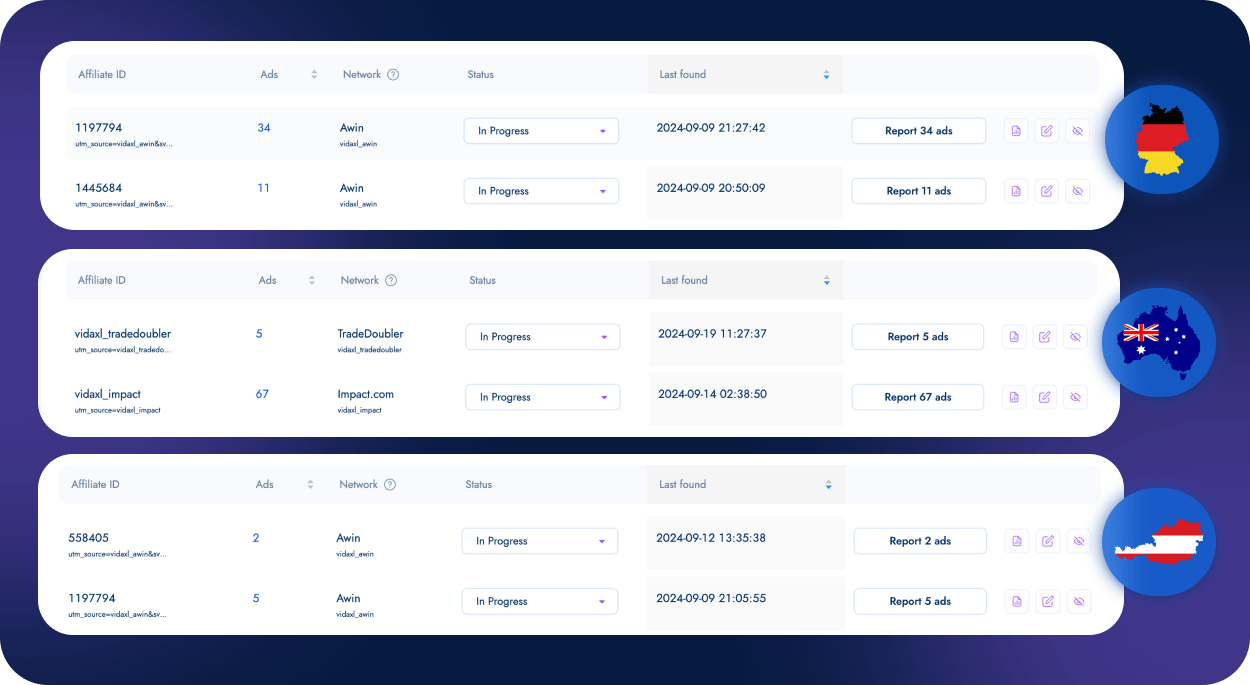
Contents
Affiliate marketing can be a powerful tool for expanding brand reach, increasing sales and cost optimization. However, it comes with its own set of challenges, particularly when it comes to ensuring compliance with affiliate program terms.
Publishers often violate these terms, leading to brand misrepresentation, customer confusion, and wasted marketing budgets. The need for digital brand monitoring has become more crucial than ever to safeguard against these issues.
This article will examine common types of affiliate program violations, explore who bears the responsibility for keeping affiliate programs clean and compliant, and explain how to effectively monitor for violations , including the role of brand misrepresentation protection.
Introduction: The Case of VidaXL
Affiliate program terms are the foundation for working with publishers. However, these terms are frequently violated, as seen in the case of VidaXL, an online retail brand.
In this article, we'll explore the types of violations that occur, how these violations can be tracked using Bluepear's digital brand monitoring solutions, and why affiliate networks must take a proactive role in maintaining compliance, especially in the realm of affiliate marketing optimization.
Brand Bidding Violations
A common type of violation involves brand bidding. VidaXL's affiliate program terms strictly prohibit the use of their brand name, misspellings, or synonyms as keywords in pay-per-click (PPC) advertising on search engines.
The aim is to prevent affiliates from circumventing the Koopgoedkoop terms, which are designed to protect the brand’s integrity and advertising efforts. Specifically, affiliates may be required to add such keywords as negative keywords to avoid violations.
What Our System Found:
Despite these clear guidelines, many affiliates still engage in brand bidding. Our system detected multiple instances where publishers were using VidaXL’s brand name or variations of it to attract traffic.
This not only violates VidaXL’s program terms but also creates a confusing experience for consumers, who might think they are clicking on an official VidaXL ad when they are not.
Such practices lead to a false representation of the VidaXL brand, waste marketing budgets on unapproved commissions, and can even cannibalize the brand's internal paid ads. Digital brand monitoring is essential to catch these violations early.
Coupon Code Violations
Another frequent violation involves the misuse of coupon affiliate codes.
According to VidaXL's affiliate program terms, affiliates may only use coupon codes that VidaXL has explicitly created for distribution through affiliates with whom VidaXL has a contractual relationship, or those that have been approved by Koopgoedkoop in a newsletter distributed for sharing.
The use and publication of any other unauthorized coupon codes or vouchers are strictly prohibited.
What Our System Found:
Our digital brand monitoring system identified numerous instances where affiliates were using unauthorized coupon codes to attract customers.
These codes often mislead customers with promises of discounts that either don’t exist or are not officially sanctioned by VidaXL. This not only damages the customer experience but also devalues the brand's pricing strategy.
Furthermore, the use of unauthorized coupon codes can lead to wasted money on commissions that should not have been paid out. To prevent these incidents, brands must focus on brand misrepresentation protection to safeguard their image and ensure customer trust.

Active Violations of Program Terms
Active violations of affiliate program terms, such as brand bidding and unauthorized use of coupon codes, can have several negative effects:
- 1. Confusing Consumer Experience: Customers may be misled by unauthorized ads or invalid coupons, leading to a loss of trust in the brand.
- 2. False Representation of the Brand: Unauthorized activities can create a false image of the brand, leading to misrepresentation and long-term damage to brand reputation.
- 3. Wasted Marketing Budget: Brands often end up paying commissions for traffic that was acquired through unapproved or misleading tactics.
- 4. Cannibalization of Internal Paid Ads: Affiliates bidding on brand keywords can outbid the brand’s own PPC efforts, leading to unnecessary expenses.
To mitigate these risks, digital brand monitoring is essential to ensure clear, enforceable terms are in place. If there are cases where breaches are allowed under certain conditions, brands must clearly state these exceptions in their terms.
The Role of Affiliate Networks: A Shared Responsibility
While brands must take an active role in managing their affiliate programs, affiliate networks also bear a significant responsibility. These networks often pride themselves on their large publisher bases and their expertise in affiliate marketing optimization.
If they are offering account management services to brands, especially those of significant size, they should actively monitor and manage affiliate activities to ensure compliance.
Why Affiliate Networks Should Lead the Charge:
- • Expertise and Resources: Affiliate networks are niche experts in this domain, and brands may not have all the necessary affiliate knowledge or resources in-house.
- • Proactive Management: Networks should assist brands in staying compliant by providing regular audits, alerts for suspicious activities, and advice on affiliate marketing optimization affiliate partnerships.
- • Shared Accountability: Since networks profit from commissions on affiliate sales, they have a vested interest in ensuring that the traffic generated is legitimate and adds value to the brand. Employing digital brand monitoring helps achieve these goals.
How Bluepear Can Help
In the digital landscape where competition for consumer attention is intense, digital brand monitoring is essential. Implementing robust online brand protection strategies is crucial to maintaining your brand's reputation, preventing unauthorized use, brand misrepresentation, and ensuring it stands out to potential customers.
Bluepear’s Online Brand Protection Solution Allows You To:
- • Monitor Your Brand's Online Presence: Keep an eye on your brand across all channels to quickly identify any misuse or brand misrepresentation.
- • Identify and Address Unauthorized Use: Quickly spot affiliates who are not complying with program terms and take action to prevent further violations.
- • Protect Your Trademarks and Intellectual Property: Ensure your brand’s name and assets are used appropriately.
- • Optimize Search Engine Visibility: Protect your brand from unauthorized brand bidding that can compromise your PPC campaigns.

Final Thoughts
The responsibility of keeping affiliate programs clean is shared between brands and affiliate networks.
While brands must enforce their terms and proactively manage their programs, affiliate networks, as experts in the field, should take an active role in monitoring and maintaining compliance.
With the help of tools like Bluepear, both parties can work together to build a stronger, more transparent, and more effective affiliate marketing ecosystem. Start a free trial for better affiliate marketing optimization and ensure brand misrepresentation protection through effective digital brand monitoring strategies.

